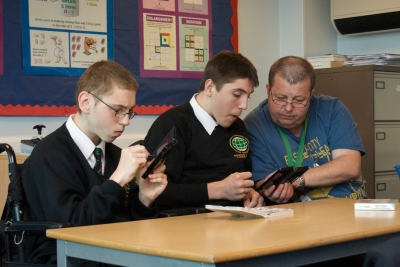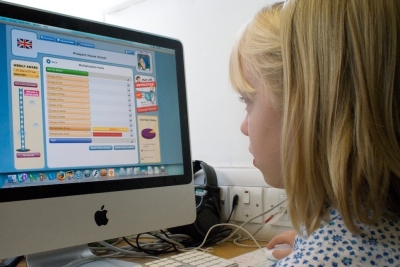The article below was first published on 20 December 2006. It still stacks up now, but I have one or two additional comments to make at the end.
What could be better than receiving a box of books? Receiving a box of books that you wrote, of course! Is there a place for self-publishing in schools?
The books I refer to are the two booklets I wrote, on Every Child Matters and Boring ICT lessons. These were produced by print-on-demand, through Lulu, but published by, an therefore assigned an ISBN number by, Terry Freedman Ltd.
I ordered 10 copies of each in order to be able to comply with the UK requirement to send 6 copies of a newly-published books to various libraries and agencies. And that, of course, leaves 4 copies of each for me to send to reviewers and casually leave lying about when guests come to the house....
But isn't this just a case of vanity publishing? Well, yes and no. "Yes", in the sense that you pay the costs of having it printed and bound, whereas in mainstream publishing those costs are borne by the publisher. And "Yes" in the sense that if it's a niche product it would be hard to find a mainstream publisher that will take it on, which leaves doing it yourself as the only option. But "No" in the sense that if, as in my case, you have been approached by mainstream publishers and declined their advances and therefore made a free choice about whom you want to publish your book. And also "No" if the book has virtually no market at all (cf The Long Tail), which is what I should like to consider now.
Print on demand is a very good option when you need very few, perhaps even just one, copy of a book. The origination costs, ie the fixed costs of setting up the book, are not spread over a large number, and so the fixed cost per book is relatively high. On the other hand, you don't have the twin problems of trying to find (a) start-up capital and (b) room to store hundreds of copies. In the case of Lulu, it's easy to amend the text of your book very quickly too, which in education, and especially the educational technology field, is a must these days.
So, what does all this mean for the ICT (Educational Technology) leader in a school?
I have long believed that if you want people to take something seriously and treat it with respect, it has to look good. What can look better than a publication which looks like it just came from a bookstore? Most schools do not have the facilities to be able to even begin to compete.
So, if I were a Head of Department or subject leader in a school now, I would use Lulu for a number of purposes:
- The staff handbook
- The 3 year strategic plan
- Information about assessment
- A year planner or calendar with important internal events (like report deadlines, term dates) and external events (like conferences) pre-filled in.
- Students' completed projects (added Dec 09)
- Students' leaving portfolios (added Dec 09)
If you wanted to produce your own textbook to distribute to all your students, it may be better, because cheaper, to go down a more traditional self-publishing route. That means, finding a printer who does short print runs, ie 500 or 1000. The biggest barrier to this avenue is the advance cost.
I'm not convinced that such a strategy would be cost-effective: On the one hand traditionally-published books are much cheaper as a rule. On the other hand, it's hard to beat the cost of a ring-binder and handouts or, of course, an online collection of resources.
But for the purposes of boosting your team's morale and creating a great impression with inspectors, having a dozen each of a few publications printed is hard to beat.
Reflections, two years on
Having read this article again, two years after I wrote it, the question arises: do I still agree with it? Broadly speaking, the answer is 'yes', but it's not quite as simple as that.
It is definitely the case that print-on-demand works out more expensive per copy than going to a short-run publisher. However, the issue for me would be: how many copies are required, or are you likely to sell? In other words, the more narrow the niche, the more attractive becomes print-on-demand. So if, say, you want enough copies for your ICT team and perhaps a few more to hand around, I would think that print-on-demand is the way to go.
However, I would not recommend print-on-demand for fiction writing if you can possibly avoid it. Self-published fiction is still associated with rubbish that is not good enough for mainstream publishers to bother with. I think that perception is slowly changing, because most new writers simply do not get a look in these days, and there have been some notable self-published successes. (Update: I accidentally referred to 'non-fiction' in this paragraph in the original version; I have corrected this, although hopefully the context, and the following paragraphs, will have indicated that I'd made the error, which was a slip of the pen as it were.)
In fact, if you have the stamina and the time, there is probably a case for saying that the best thing you can do is self-publish your novel (say) and market it incessantly in the hope that it will come to the attention of a mainstream publisher. But don't count on that happening, not least because you will be hard-pressed to even get it reviewed.
There's another caveat here. The CEO of Lulu didn't do anyone any favours when he said earlier this year that Lulu publishes the worst collection of poetry in the history of mankind. (See this article for a report on that by Angela Hoy, and this article for a follow-up.) I should not go so far as to say that he did a Ratner, because everyone knows that Lulu does not edit manuscripts (you'd have to purchase that service as an extra), and that many, probably most, self-publishers have received 'critical' acclaim from nobody other than themselves and their families and friends, who for the most part are too caring and too polite to say, "Sorry, but you just can't write. Take up painting instead."
Even so, I don't think comments like that help the general perception, based on a bygone era which possibly never existed, in which manuscripts were either eagerly snapped up by publishers willing to invest money and time into them, or were taken to a vanity press.
People's perception of self-publishing is better in non-fiction, certainly in the UK, possibly because people recognise that a lot of non-fiction would not be commercially viable for a mainstream publisher. Also, if you are recognised as an expert within your field, people in the same field are almost certainly not going to be deterred by your book's self-published status.
Of course, these days you can easily avoid physical books altogether and go down the ebook route. But why not do both?
I'd be interested in hearing about your views and experiences in these areas.














